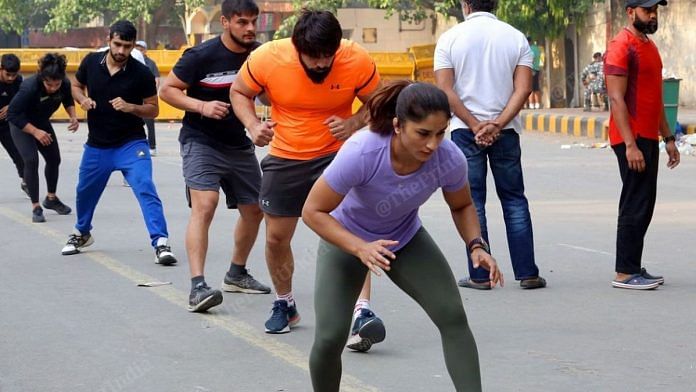Sonipat/Rohtak: Wrestling students grunt and grapple at the Yudhvir akhada in Haryana’s Sonipat. But 20-year-old Ashu Malik keeps her distance, tears leaving salty tracks on her cheeks. No competitions in a year have choked her motivation, and her first day back at the mats after a month-long break has done nothing to rekindle hope.
“I really thought I’ll get my breakthrough this year, but there are no competitions. I practised a lot, but I guess it wasn’t enough,” said Ashu, who has been training since childhood. At the Yudhvir Wrestling Academy, located in the middle of a mustard field, the air is dense with the smell of sweat and blood as students end their day with dands (burpees). As her coach consoles her, Ashu says this year has made her doubt her abilities. “My family is spending so much money on me… but it feels pointless to keep training,” she adds.
The year 2023 was historic; Indian wrestlers banded together as a protest collective against sexual assault, but their game suffered at an individual level. The sentiment now in Haryana is one of exhaustion when it comes to the ‘clean up’ of wrestling.
Hundreds of young grapplers, like Malik, bore the brunt of turmoil that gripped the Wrestling Federation of India (WFI) after some of the country’s star wrestlers accused Brij Bhushan Sharan Singh, its president at the time, of sexual harassment. With national championships and Sports Authority of India (SAI) training camps cancelled, they are left in limbo.
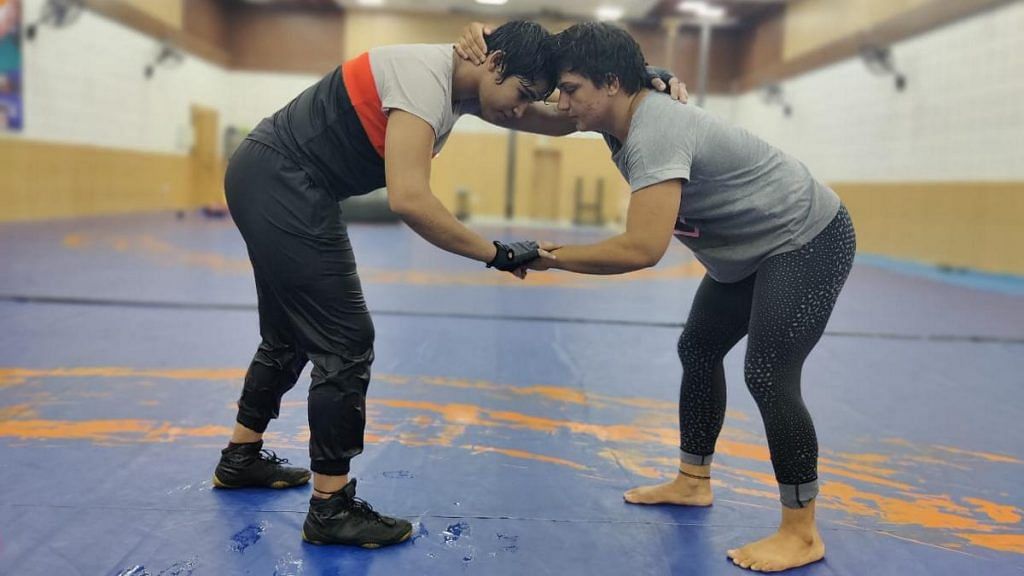
Last January, wrestlers braved the bitter cold to protest in New Delhi’s Jantar Mantar for justice. Top Haryana medallists Bajrang Punia, Vinesh Phogat, Sangeeta Phogat, and Sakshi Malik staged a sit-in, demanding Singh’s arrest. Through this round of protests and then again in April-May, they faced police scuffles, battled vilification, and even threatened to throw their hard-fought medals into the Ganges. And through it all, junior wrestlers stood alongside the veterans at the protest site, even training with them.
Such solidarity came at a price.
Wrestling students, who typically forego higher education to train in residential facilities, have found themselves left adrift by the lack of competitions this year. These events serve as important benchmarks for them to gauge their ability and progress as sportspersons. National-level competitions also help them gain international exposure, earn grants to sustain their careers, and even secure competitive jobs.
At this point, only those with money can afford to continue wrestling coaching. My friends are helpful so they let me eat from their plates
-Wrestling student from Haryana
The WFI has been largely non-functional since January last year when Brij Bhushan stepped aside. While an ad-hoc committee of the Indian Olympic Association manages day-to-day affairs, players express frustration over the lack of a fully operational federation.
A new wrestling federation, led by Brij Bhushan’s aide Sanjay Singh, was elected in December, but it triggered another controversy. Wrestlers returned their awards, and the sports ministry suspended the federation due to multiple sports code violations, dampening hopes of the wrestling scene normalising.
Now, many have even started questioning the intent of their home-grown heroes, especially after a minor wrestler, based in Rohtak, rescinded her complaint against Sharan Singh.
Ironically, a movement that set out to reform Indian wrestling has inadvertently harmed the prospects of young grapplers, leaving them in the dust as collateral damage.
Also Read: Wrestlers’ protest long over. But one woman on a mission to keep it alive in Haryana villages
Rationing food, losing job opportunities
Sushil Khasa, a 20-year-old wrestler at Mehar Singh Akhada in Haryana’s Rohtak, had his sights set on gold at the Under-20 national championships this year. More than just a trophy, a medal meant a grant of nearly Rs 2 lakh from the Haryana government—a chance to help sustain his gruelling training requirements.
“When it was announced that the national championships were to be held in December, there was fresh energy among the students, everyone was training extra hard, losing weight. When the competition was cancelled, my spirit was shattered. I broke down crying,” he says.
In Haryana’s hinterland, wrestling is not just a sport. It’s a ticket to a brighter future and a track for upward social mobility and even jobs. Just like lakhs who strive for government jobs through competitive exams, many youth in Haryana pin their hopes on wrestling mats, aiming for the security of hefty prize money and coveted government positions.
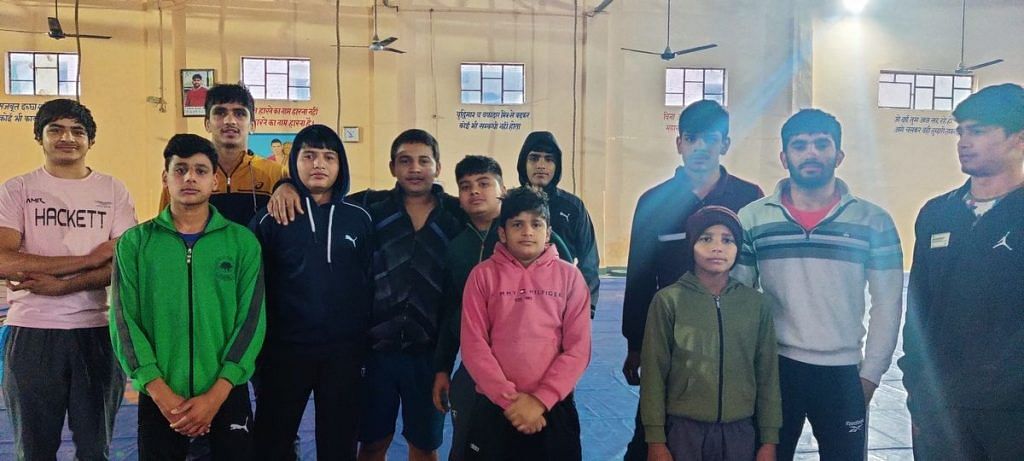
Due to the sombre mood this year, fewer private dangals (local-level tournaments) have been organised in Haryana, multiple wrestlers said. For many of them, like Sushil, winning matches in private dangals is a stream of additional income, usually going toward their protein-rich diet, which includes eggs, almond milkshakes, and supplements. “I have had to ask my parents for money. I feel ashamed asking for so much support all the time,” he said.
Some (young wrestlers) have gone on less nutritious diets— cutting out eggs or almond milkshake or protein powder from their meals and switching to basic dal-sabzi roti
Jaiveer, wrestling coach
The past year has been a harsh reality check for Sushil. Several of his peers at the akhada, discouraged by the lack of competition and financial constraints, have abandoned their wrestling dreams and sought work abroad. Most do not have higher education degrees, so their options are limited to blue-collar jobs like driving taxis or working in farms.
“Those whose parents couldn’t support them left. I had been training with some of them since I was a child,” Sushil said.
Coach Jaiveer at the wrestling school claimed that 40-50 students left this year due to financial strain. Those that are continuing are sometimes forced to compromise on their diet. Their diet costs around 25,000 a month, and shoots up to as much as Rs 50,000 before competitions, he said.
“Those who can’t afford to sustain themselves have left. Some have gone on less nutritious diets— cutting out eggs or almond milkshake or protein powder from their meals and switching to basic dal-sabzi roti,” Jaiveer said.
Wrestling is slowly becoming a privilege that only the wealthy can afford. One student said, on condition of anonymity, that he is relying on his roommates’ generosity to keep up with his dietary requirements.
“Not every family is well-to-do. But at this point only those with money can afford to continue wrestling coaching,” he said. “My friends are helpful so they let me eat from their plates. Not everyone is this helpful.”
Dip in performance?
India’s wrestling arena roars to life every year with the 22 national championships across various weight and age categories. Typically concluding by June, these championships are the heartbeat of Indian wrestling. The schedule for these competitions is decided in a general body meeting of the WFI, according to a former federation official. However, since the WFI has been suspended, there has been no such meeting this year, he added.
The top four medal winners (1 Gold, 1 Silver, and 2 Bronze) for training at year-long SAI camps to represent India in various international competitions. But this year, wrestlers secured spots or international events just through trials.

While medal tallies at the World Championships (one bronze) and the Paris Olympic qualification by Antim Panghal might suggest an unaffected international performance, a closer look reveals cracks, according to former WFI officials.
“At the Asian Games, we have been consistently winning gold medals. But lack of competitions and training led to an underwhelming performance,” a former WFI official said. At the 2018 Asian Games, Indian wrestlers won two gold medals and one silver. In 2022, India brought home two bronze medals and one gold.
Only one national championship was organised this year— the under-17 in April—after the WFI had briefly resumed functioning after an inquiry by a committee led by Mary Kom. However, from 23 April, wrestlers including Bajrang Punia, Sakshi Mallik, and Vinesh Phogat resumed protests in Delhi, after which the rest of the competitions were cancelled.
Only politics between mahabalis (heavyweights) is going on at the highest echelons in wrestling. But nobody stopped to think if the tiff between them would affect the careers of younger students
Dayanand, parent of a wrestler
Bhupinder Singh Bajwa, president of the ad-hoc committee overseeing the wrestling federation, told ThePrint that the IOA would announce national championship dates “soon”, but did not provide further details. He declined to comment on the committee’s failure to host competitions throughout the year. “All competitions will be conducted, and we will give you details when the committee has met and announced the dates,” he said.
Bajwa didn’t say how players would be compensated for the vacuum in the sport. Wrestlers like Sunny, a coach at the Mehr Singh akhada in Rohtak, are now calling for provisional certificates to help wrestlers apply for government scholarships. “Every year 15-20 people from this akhada get placed in a government job. What will happen next year? Has anyone thought it through?” he asked.
On the issue of certificates being provided for 2023, Bajwa said that he’d “do everything to help” but provided no details.
Bureaucratic nightmare
The disorderly way the wrestling federation’s affairs were conducted led to nightmarish consequences for young players. They starved themselves to lose weight only for competitions to be cancelled later. They spent sleepless nights contemplating lost opportunities and endured taunts from relatives about ‘wasting time’ at akhadas. Their sport was torn between two sides and their heroes were weeping helplessly on camera.
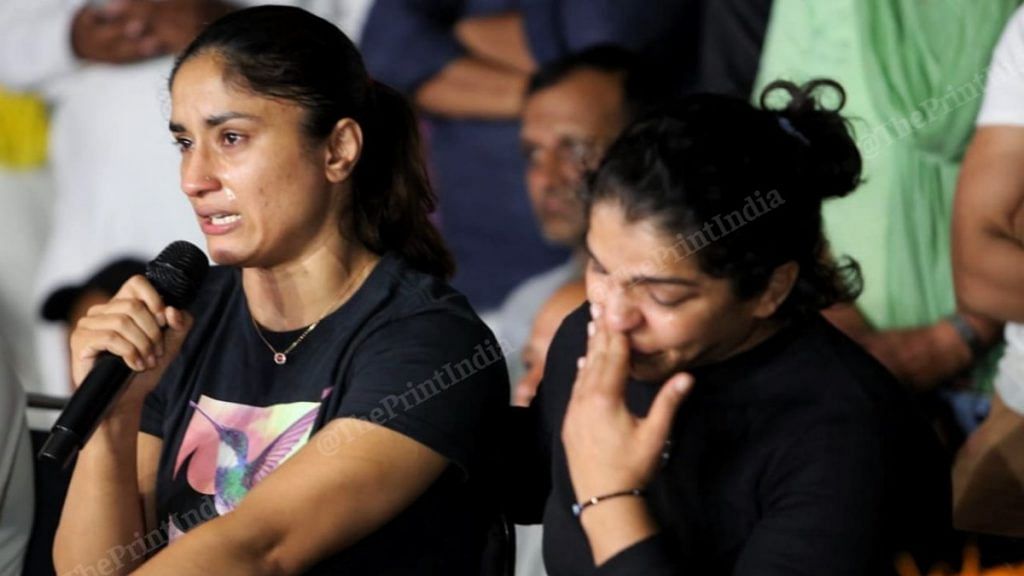
“It all seemed like a joke. Competition is happening, not happening, will happen later. We have to lose weight for these competitions, and we have to do it quickly. It took a toll on our health,” a wrestler said, on the condition of anonymity.
Coach Jaiveer echoed this concern, noting the difference between healthy, gradual weight loss and crash diets. The latter, he said, is what wrestlers were “forced” to do this year. “Such weight loss strains the body for three months,” he added.
Competitions were announced and cancelled twice. First time in April, second time in December. In between, young players were on their toes as rumours of impending competitions were constantly in the air.
The bureaucratic nightmare did not end there. Students said that there was no way for them to get their previous certificates attested, a mandatory requirement when applying for grants or jobs. “We went to Delhi to get my certificate attested. The IOA told us that they couldn’t attest my document because they don’t have data. When I contacted the federation, they told me they’re suspended so can’t help,” said under-20 wrestler Atul Hooda from Rohtak. “Where do I turn?”
Hooda had won a medal in the national championships last year and earned a school scholarship as a result. He’d hoped for more medals, scholarships, camps, and maybe even the chance to compete abroad. Now the constant ping-pong between the IOA and the federation is putting paid to all those aspirations.
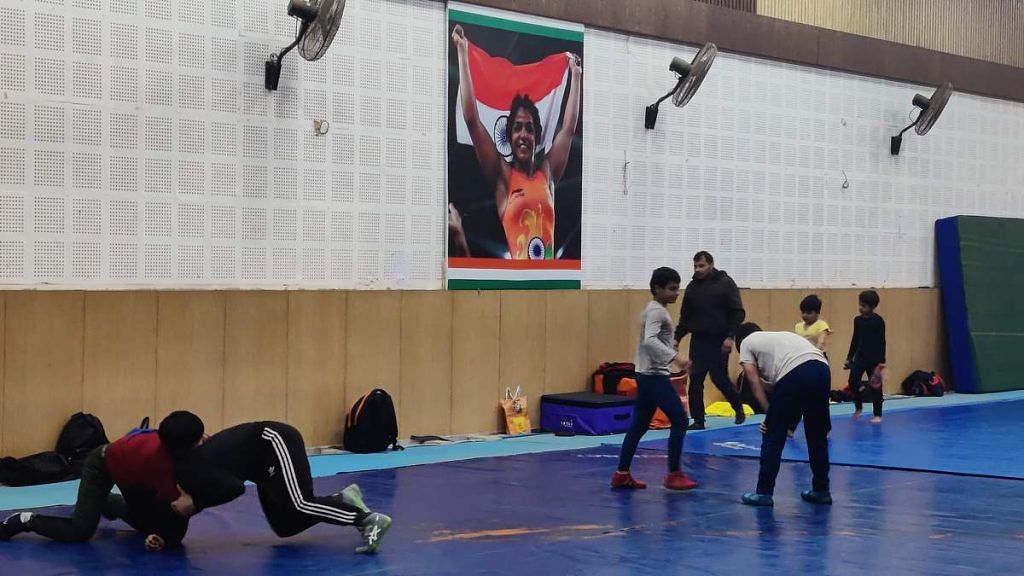
“First, they announced championships in April. I dropped weight for them, but they were suddenly cancelled after the federation was suspended. The same thing happened in December. It causes so much frustration. I keep asking myself, what I am training for?” Hooda said. What is keeping him going for now, he added, is the encouragement of his coaches and peers and the hope that the logjam won’t last much longer.
With just six months until the Paris Olympics, the prevailing uncertainty is casting a shadow over India’s medal hopes.
An SAI coach said that senior training camps are usually conducted throughout the year, and are attended by the country’s top wrestlers, but these have now been put on hold. Ahead of the Olympics, this amounts to a major setback. “At camps, the wrestlers get a prescribed diet, kits, the best coaches, and most importantly an atmosphere to train for the highest platforms. This year, they got nothing,” she said.
Also Read: Kalakshetra Chennai has a PoSH problem. Students fume, gag order imposed, art world shaken
Protest fatigue, cynicism
At the Sir Chhotu Ram Stadium in Rohtak, Dayanand and Virender Singh, both in their 50s, sat among other parents, observing their children practice beneath a grand portrait of Sakshi Malik proudly beaming with the Indian flag in her hands. Their exasperation with the state of wrestling administration was evident.
“Only politics between mahabalis (heavyweights) is going on at the highest echelons in wrestling. But nobody stopped to think if the tiff between them would affect the careers of younger students,” Dayanand said.
Dayanand, Virender, as well as other parents and guardians at Chhotu Ram Stadium said they were running out of patience with the persisting uncertainty at WFI. Some even expressed doubts about the wrestlers’ intentions.
The latest irritant was Bajrang Punia’s mock wrestling bout with Congress leader Rahul Gandhi in Jhajjar, on the same day that the parents were speaking to ThePrint.
“Why is (Punia) playing with Rahul Gandhi? To show his affinity with him right? These guys are done with wrestling, and now they are minting a political career at our expense,” Dayanand said.

For young wrestlers like Virender’s daughter Muskan, who is under 20, the logjam has extracted a heavy cost. He pointed out that Muskan had won the Haryana state games in the 59 kg category this year and thus had a good shot at clinching a national medal too. “But the competition was cancelled not once but twice. Winning a medal would have made her eligible for a job, for a grant that would have helped me put money in her dreams and let nothing hold her back,” he said. “She has been practicing for 6 years. Every month we spend Rs 45,000-50,000. When the time to see the results finally came, the games were cancelled. This has shattered our spirits.”
My dream was never just to win a medal. It was to win a medal and then run across the stadium with the tiranga in my hand
Ritika Hooda, wrestler
Even wrestlers who did make it to international platforms via qualifying trials couldn’t fully enjoy their victory, according to Ritika Hooda, who won the under-23 gold at the World Championships.
“My dream was never just to win a medal. It was to win a medal and then run across the stadium with the tiranga in my hand,” Hooda said. Since the WFI had been suspended by United World Wrestling, the games were conducted under a neutral banner. “I was happy that I won,” she added, “but also not that happy.”
For wrestlers like Hooda, such victories served as crucial motivation. But for others like Ashu, the year without competition has pushed them to the edge. With the sport disrupted, women wrestlers find themselves especially vulnerable to societal pressures, particularly expectations of marriage.
“Some relatives taunt my family. They ask what I am doing, they say I am wasting my prime years, that I should get married,” Ashu says. Then, she adds with a faint smile that her family is standing by her and is not ready to let her loosen her grip on wrestling yet.
(Edited by Asavari Singh)


